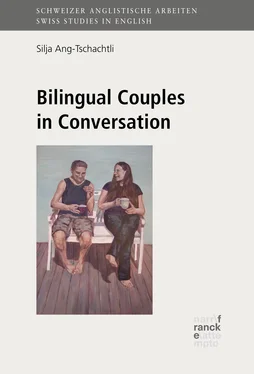1 ...8 9 10 12 13 14 ...23 Like Piller, Gonçalves (2010a, 2010b, 2013) concentrated on the topic of identity in her work on bilingual couples. She examined conversations with seven couples consisting of a native speaker of English and Swiss German, as well as two conversations with English speakers, each of whom was in a relationship with a Swiss partner, but who participated without their spouse. All of the couples resided in central Switzerland. Gonçalves analysed their speech with regard to their language ideologieslanguage ideologies and identity performancesidentityperformance ofperformingself. Her main focus was not on the communication between the partners, or “couple talk”, but rather on the female Anglophone partners’ personal experiences in their partnership and their host country. In particular, she focused on the discursive construction of identitiesidentitydiscursive construction of and on doing Swissperformingculture, by looking at the linguistic and socio-cultural practices that the participants had adopted or rejected (2013: ch 7). According to Gonçalves, people in such an expatriate situation “are constantly positioning and re-positioning themselves as certain types of individuals who perform or carry out particular local and socio-cultural practices within specific contexts” (Gonçalves 2010b: 76). To demonstrate this, she analysed a variety of linguistic resources used by the participants, “such as direct reported speech, prosodically marked utterances, pronominal use, code-mixing, and overt mentions of identity labels to position themselves and each other while simultaneously indexing various types of identitiesidentitymultiple” (Gonçalves 2013: 192–193). Based on these features, she explored to what extent the identities of the English-speaking partners have shifted, and showed that some of them completely reject having an identity made up of both cultures, whereas others accept or even embrace a multiple or culturally hybrid identity (2013: 203).
In addition, Gonçalves investigated her participants’ language ideologies with regard to Standard German and the local dialect, as well as their perceptions about their language learning process. She perceived a correlation between the non-native speakers’ perception of their own skills in the local Bernese dialect and their notion of having a Swiss identityidentitynational (2010b: 82). Moreover, Gonçalves found that the Anglophone partners in her study “position[ed] and align[ed] themselves with Swiss German native speakers and their respective language ideologies” (2013: 151). The participants’ reports indicated that their process of language learning “was always inevitably connected to their own language ideologies and the continuous re-production of the ‘ideology of the dialect’ within their constructed social relations” (2013: 163). Based on her interviews, Gonçalves concludes that doing Swiss is “an intersubjective collaboration of social, cultural, gendered and linguistic practices and performances that emerge in social interaction” (2013: 165). Thus, language practices and ideologies may serve as a window onto the complex process of intercultural identity formation.
3.3.3 Linguistic challenges
The previous section has shown that more recent studies, such as those carried out by Gonçalves (2013) and Piller (2002a), have shifted their focus away from potential language problems arising in bilingual relationships, to topics such as the linguistic construction of identity. Miscommunicationmiscommunication is not at the centre of my analysis either; however, in the process of analysing how the couples communicate, I inevitably also consider language problems. In the following, I will therefore delineate the most important linguistic challenges bilingual couples may face. For the most part, I will concentrate on difficulties among fluent L2 speakers, such as the couples in this study.
3.3.3.1 L2 learning and use language acquisitionsecond
Living in a bilingual relationship often means that the community languagecommunity language is a non-native language for one of the partners, which can be problematic if he or she is not proficient in this language. As Pavlenko remarks, learning or using a second languagesecond language may lead to “feelings of anxiety, shame and embarrassment” if a bilingual’s competenceproficiencylow in the community language is not as high as desired (by the speaker or his/her environment) (2005: 32). If their level of competence is low, L2 speakers may also not be able to position themselves as mature, competent adults, or may be infantilized (2005: 218). All this is potentially applicable to the English-speaking partners in my study, most of whom were thrown into a new and complex linguistic environmentenvironmentdifferent without any previous knowledge of the language. Their situation is aggravated by the fact that Swiss German is not easy to learn due to its many varieties and the diglossic situation in Switzerland. Since many Swiss would rather speak English than Standard German to a foreigner (Watts 1999: 75), learning the language can be difficult and frustrating. This was confirmed by many participants in Gonçalves’ study, who expressed frustration with their L2 language skills and the language situation in Switzerland, at least initially (2013: 151). Moreover, since many people in Switzerland view their dialect as central to “being Swiss”, being able to speak the local varietydialectideology of is crucial to the Anglophone partner’s integration (see section 2.3, “Diglossia and the ideology of dialect”).
Being in a bilingual relationship usually means that at least one of the partners has to speak a language that is not his or her mother tongue, which may be a challenge for both partners as well as for their relationship. For one, the L2 speaker might be in a weaker position in discussions and arguments, and thus have less control within the relationship. As Piller puts it, “[i]n the linguistic construction of reality, power may also accrue to a person through being an undisputed expert manipulator of a code, a native speaker” (2002a: 142). This is particularly the case if the non-native partner is not proficient in the relationship language. In addition, not speaking one’s mother tongue in one’s family environment may also be perceived as a loss of cultural identityidentityloss of. Breger and Hill argue that the language in which the partners in a bilingual relationship decide to communicate “can be symbolic of the extent to which each partner is prepared to forego her or his cultural background and incorporate new elements” (1998: 21). This can pose a problem if the relationship language is the community language, so that one partner does not speak his or her mother tongue anywhere. As Piller remarks, “[i]n intercultural relationships the partner in whose native country the couple live is clearly privileged: legally, economically, and usually socially, too. […] Being a foreigner and having to use a non-native code places a person in a doubly marginalizedmarginalization position” (2000: section 4.3, para. 1).
In the case of the couples whom I interviewed, the situation is mitigated by their choice of couple language and the non-native partners’ proficiencyproficiencyhigh in this language. Since the Swiss partners are fluent in the relationship language, the native speaker might only have a slight advantage (or even none at all) in discussions or negotiations. Furthermore, potential issues are balanced out to some extent by the fact that their (main) relationship language is not the community language. This means that while one partner has the (possible) advantage of being able to use his or her mother tongue at home, the other one is able to use his or hers outside of the home. However, it should also be noted that choosing a language other than the community language as the main relationship language can be a disadvantage in the long run for the immigrant partner, since insufficient proficiency in the community language can limit access to employment (Piller and Pavlenko 2007: 18). Thus, while the speaker of the non-communitynon-community language language may benefit from using his or her native tongue within the relationship, this might prevent him or her from becoming fluent in the community language, and thus perpetuate his or her situation in the community as a linguistic outsider (see also section 5.2.2, “Community language”).
Читать дальше












